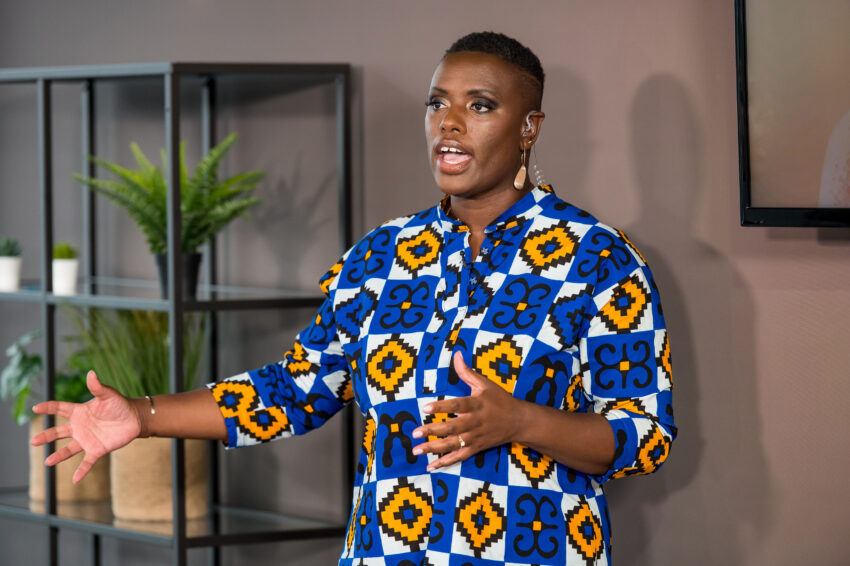
Shereen Daniels is a bestselling author of The Anti-Racist Organisation: Dismantling Systemic Racism in the Workplace, a three-time LinkedIn Top Voice, and a former winner of HR Most Influential Thinker.
As the Managing Director of the award-winning HR advisory firm HR rewired, she is dedicated to driving meaningful change within organisations.
HR rewired excels in racial equity assurance, assisting public, private, and non-profit organisations in assessing the impact of their practices on marginalised employee groups. Their work focuses on both inward effects—how company culture influences employees—and outward impacts on societal equity and stakeholder perceptions. Using a proprietary methodology and diagnostic tools developed in collaboration with experts in anti-racism, ESG, human rights, and sustainability, the firm conducts comprehensive racial equity risk assessments to identify and mitigate racism, bias, and discrimination.
Additionally, Shereen serves as Chair of the African Diaspora Economic Inclusion Foundation, furthering her commitment to inclusivity and equity.
In this Q&A, we delve into her inspiring journey and vision for a more equitable workplace.
What was the inspiration behind HR rewired?
The origins of HR rewired, a company dedicated to transforming the experiences of employees most impacted by racism, bias, and discrimination, are rooted in both my personal and corporate experience. The harrowing events surrounding the murders of Breonna Taylor and George Floyd and the subsequent social protests were pivotal moments that sparked my journey.
In May 2020, I recorded a 20-minute video on my mobile phone in my bedroom, talking about my experiences as a Black woman navigating the discomfort around race and racism within the UK. What started as a single, raw, and honest video quickly grew into a YouTube series. One video became five, then ten, and soon, I found myself recording for 100 consecutive days.
My videos were regularly reshared on social media, catching the attention of Forbes and leading to my recognition as a LinkedIn influencer, amassing over 100,000 followers. This newfound platform meant that CEOs and founders of global brands and household names requested my support and guidance.
Alongside the 2022 publication of my bestselling book The Anti-Racist Organization: Dismantling Systemic Racism in the Workplace, my company has supported brands corporate brands from Google, to Wagamama’s, De Beers to Vodafone as well as nonprofits such as Prostate Cancer, YMCA, Duke of Edinburgh to help evolve their workplace cultures to work for the many, not just the dominant few.
Looking back, is there anything you would have done differently?
My strong personal brand heavily influences the success of my company, a double-edged sword that brings both opportunities and challenges. While people naturally buy from those they trust, especially in a small company, this often means embodying the business until it grows large enough to develop its own identity. You are the business in the eyes of your clients, and it can be difficult to navigate when you are trying to scale and bring in new senior team members.
Reflecting on my journey, I wish I had been more aware of how much I wanted my business to rely on my brand. This would have allowed me to make slightly different marketing choices, for example, when it came to HR rewired. The company brand was on the backburner, which could make it difficult in the future for me to hire people to take over the running of the business. It’s not an issue now, but I feel I should have been more aware of it.
Addressing these challenges required clear role definitions, understanding how my personal brand affects the company, and a strategic repositioning of our products and services to meet market demands. It also demanded a willingness to take calculated risks and often put my personal feelings to one side.
What defines your way of doing business?
A steadfast commitment to making a tangible difference for employees whose racial identity negatively impacts their ability to perform and be accepted at work. My approach is grounded in core values of honesty, transparency, and the courage to say what is necessary, rather than what is most comfortable or palatable.
I believe in running a lifestyle business that aligns with how I wish to work. I partner with clients who are ready to push past their discomfort, roll up their sleeves, and move from debate to action. This means working with those who are not just talking about change but are committed to implementing it.
As a former cancer survivor (I had stage 4 Hodgkins Lymphoma), I am acutely aware of how stress and burnout can impact the body, but also the necessity of working in a way that allows one freedom of choice to a point and freedom of expression. Therefore, my way of doing business is more about how I wish to live my life.
What advice would you give to someone starting out?
My advice to entrepreneurs starting out is to be crystal clear about the problem you’re solving and ensure it aligns with the problems clients are willing to pay to solve.
Remember, an idea is only as good as its execution—done is better than perfect. Continuously hone your craft and maintain discipline to build a brand that establishes you as the unchallenged authority in your field.
Embrace the reality that entrepreneurship is filled with often costly challenges and mistakes; failure is part of the process. Be bold in asking for help and humble enough to accept it when offered.
It’s also crucial to move beyond the allure of the entrepreneurial title and focus on creating real value that attracts customers. Fall in love with the impact rather than the idea. Recognise the difference between loving the idea of entrepreneurship and running a viable business.
Finally, build a strong support network. The entrepreneurial journey can be lonely, so having people to exchange ideas with, seek support from, or simply chat with is essential to keeping you sane! Stay true to your values and keep pushing forward while simultaneously recognising when it’s time to pivot.